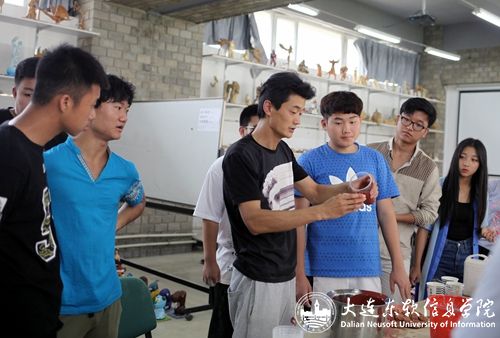“Hold your pottery steady, dip it into the glaze gently, the primary coat is done” Song Shukui, a teacher in the Department of Digital Arts is explaining about how to make pottery for the students in the studio. There, about twenty or thirty students are carefully crafting their own pottery works. Today, however, there is no 3D modeling lesson. What attracts the students and teachers to the studio to learn in non-curriculum time then?

Teacher Song Shuqui is teaching the students to coat the pottery. Photo by Lvzuo Yi photo "This year, we adjusted the curriculum and invited the pottery expert from Shandong. Through modeling, glazing, and firing, students will be able to produce works. Everyone's interest in learning doubles," said Song Shuqui. 3D modeling class lasts for 80 hours. The previous curriculum design was unoriginal. The students choose their favorite image to imitate. Today, the course has changed a lot. Students must first be an original designer and produce their work according to the design. Ning Xiaoyan, a student from class 14001 from Animation Major said: "it is so interesting to see our own works." Class form has changed and curriculum assessment has also become more flexible. At the end of the semester, work exhibition is to be held in the Department of Digital Arts. The students' works in the class will receive the assessment of professional teachers and the "public review", which account for 50% of the student's course grade. The other 50% will be graded in accordance with their class performance. Excellent works not only receive a high score, but also earn the opportunity to be selected by the Creation Space of the Digital Arts Department and become commodities for exhibitions and sales. This has greatly enhanced the students' interest and awareness of innovation and entrepreneurship. This year, quite amount of works are selected to Creation Space. "It is still a new try to combine animation with ceramic materials for animation majors. At the same time, students can also take advantage of other professional knowledge to conduct a series of creative cultural product design, packaging, etc. and the students can also practice their creative thinking manipulative ability." said Zhang Mingbao, deputy director of the Department of Digital Arts. The practice of professionalizing the studio, integrating it with the Creation Space and commercializing the students’ works is one part of the new round of innovation and entrepreneurship reform in the Department of Digital Arts in DNUI. The organic integration of teaching, industry and market will continue to promote the students’ awareness and capability of innovation and entrepreneurship.

